(完整版)法律英语翻译考试题
- 格式:doc
- 大小:18.51 KB
- 文档页数:2
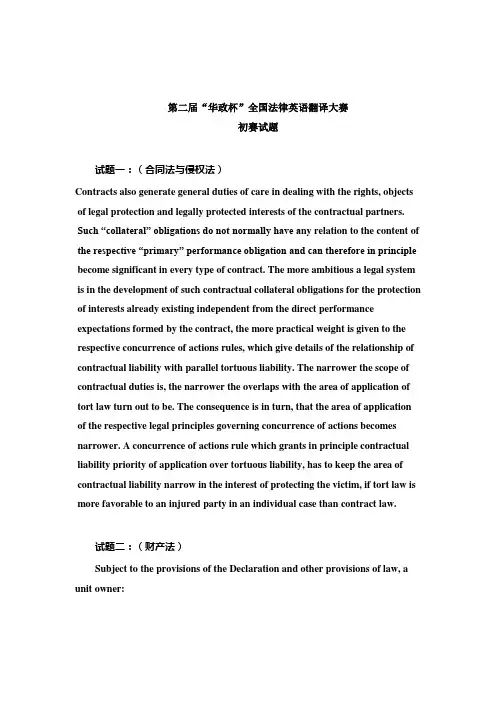
第二届“华政杯”全国法律英语翻译大赛初赛试题试题一:(合同法与侵权法)Contracts also generate general duties of care in dealing with the rights, objects of legal protection and legally protected interests of the contractual partners. Such “collateral” obligations do not normally have a ny relation to the content of the respective “primary” performance obligation and can therefore in principle become significant in every type of contract. The more ambitious a legal system is in the development of such contractual collateral obligations for the protection of interests already existing independent from the direct performance expectations formed by the contract, the more practical weight is given to the respective concurrence of actions rules, which give details of the relationship of contractual liability with parallel tortuous liability. The narrower the scope of contractual duties is, the narrower the overlaps with the area of application of tort law turn out to be. The consequence is in turn, that the area of application of the respective legal principles governing concurrence of actions becomes narrower. A concurrence of actions rule which grants in principle contractual liability priority of application over tortuous liability, has to keep the area of contractual liability narrow in the interest of protecting the victim, if tort law is more favorable to an injured party in an individual case than contract law.试题二:(财产法)Subject to the provisions of the Declaration and other provisions of law, a unit owner:(1) may make any improvements or alterations to his unit that do not impair the structural integrity or mechanical systems or lessen the support of any portion of the common interest community;(2) may not change the appearance of the common elements, or the exterior appearance of a unit or any other portion of the common interest community, without permission of the Unit Owners Association (hereinafter called “Association”);(3) after acquiring an adjoining unit or an adjoining part of an adjoining unit, may remove or alter any intervening partition or create apertures therein, even if the partition in whole or in part is a common element, if those acts do not impair the structural integrity or mechanical systems or lessen the support of any portion of the common interest community. Removal of partitions or creation of apertures under this paragraph is not an alteration of boundaries;(4) may subdivide a unit into two or more units. Subject to the provisions of law, upon application of a unit owner to subdivide a unit, the Association shall prepare, execute, and record an amendment to the Declaration;(5) The amendment to the Declaration must be executed by the owner of the unit to be subdivided, assign an identifying number to each unit created, and reallocate the allocated interests formerly allocated to the subdivided unit to the new units in any reasonable manner prescribed by the owner of the subdivided unit.试题三:(法律史)For much of our history, the United States was not a lender but a borrower of law. The United States is a common-law system; and the common law was, in its origins, essentially English. In the first part of the nineteenth century, American courts looked to English law for inspiration, to English jurists and treatise writers. Case law was peppered with citations of English cases. Notable scholar-judges, like James Kent and Joseph Story, also read, absorbed, and tried to import into American law key aspects and insights of European legal thought. The British influence declined throughout the nineteenth century; and in the twentieth century it was all but dead. American cases rarely cite foreign materials. Courts occasionally cite a British classic or two, a famous old case, ora nod to Blackstone; but current British law almost never gets any mention. In the twentieth century German philosophy had some residual influence; and Karl Lewellyn, for one, absorbed a good deal of German legal culture. It is fair to say, however, that American lawyers and jurists have been, on the whole, extremely parochial. At some crucial points, scholars and states people did look abroad. English law influenced the shape of the workers’ compensation statutes; key phrases were lifted almost verbatim from the English act. The English act, in turn owed something to legislation adopted earlier in Bismarck’s Germany. The English Companies Law of 1929 and a Securities Act of 1933 were real influences on the text of the Securities and Exchange Act. Commercial statutes similarly were indebted to British models.试题四:(公司法与国际经济法)(i) In general. The Department of Commerce (hereinafter called “Department”) normally will attribute a subsidy to the products produced by the corporation that received the subsidy.(ii) Corporations producing the same product. If two (or more) corporations with cross-ownership produce the subject merchandise, the Department will attribute the subsidies received by either or both corporations to the products produced by both corporations.(iii) Holding or parent companies. If the firm that received a subsidy is a holding company, including a parent company with its own operations, the Department will attribute the subsidy to the consolidated sales of the holding company and its subsidiaries. However, if the Department finds that the holding company merely served as a conduit for the transfer of the subsidy from the government to a subsidiary of the holding company, the Secretary will attribute the subsidy to products sold by the subsidiary.(iv) Input suppliers. If there is cross-ownership between an input supplier and a downstream producer, and production of the input product is primarily dedicated to production of the downstream product, the Department willattribute subsidies received by the input producer to the combined sales of the input and downstream products produced by both corporations (excluding the sales between the two corporations).(v) Transfer of subsidy between corporations with cross-ownership producing different products. In situations where paragraphs (b)(6)(i) through (iv) of this section do not apply, if a corporation producing non-subject merchandise received a subsidy and transferred the subsidy to a corporation with cross-ownership, the Department will attribute the subsidy to products sold by the recipient of the transferred subsidy.(vi)Cross-ownership defined. Cross-ownership exists between two or more corporations where one corporation can use or direct the individual assets of the other corporation(s) in essentially the same ways it can use its own assets. Normally, this standard will be met where there is a majority voting ownership interest between two corporations or through common ownership of two (or more) corporations.。
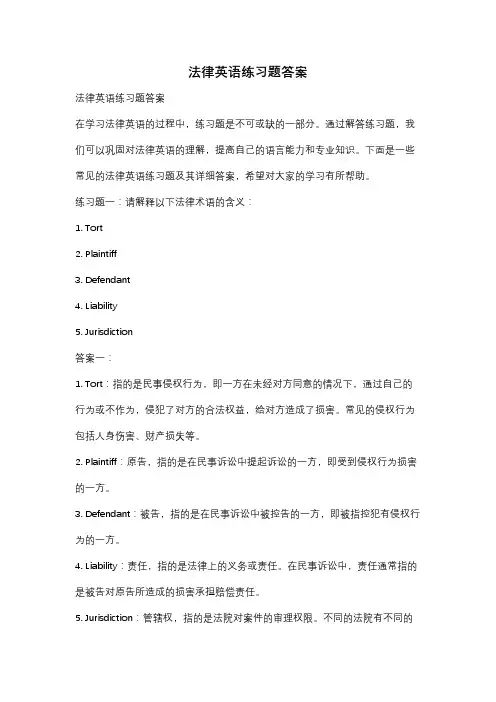
法律英语练习题答案法律英语练习题答案在学习法律英语的过程中,练习题是不可或缺的一部分。
通过解答练习题,我们可以巩固对法律英语的理解,提高自己的语言能力和专业知识。
下面是一些常见的法律英语练习题及其详细答案,希望对大家的学习有所帮助。
练习题一:请解释以下法律术语的含义:1. Tort2. Plaintiff3. Defendant4. Liability5. Jurisdiction答案一:1. Tort:指的是民事侵权行为,即一方在未经对方同意的情况下,通过自己的行为或不作为,侵犯了对方的合法权益,给对方造成了损害。
常见的侵权行为包括人身伤害、财产损失等。
2. Plaintiff:原告,指的是在民事诉讼中提起诉讼的一方,即受到侵权行为损害的一方。
3. Defendant:被告,指的是在民事诉讼中被控告的一方,即被指控犯有侵权行为的一方。
4. Liability:责任,指的是法律上的义务或责任。
在民事诉讼中,责任通常指的是被告对原告所造成的损害承担赔偿责任。
5. Jurisdiction:管辖权,指的是法院对案件的审理权限。
不同的法院有不同的管辖权,根据案件的性质、金额等因素来决定哪个法院有权审理该案件。
练习题二:请将以下英文法律名词翻译成中文:1. Contract2. Arbitration3. Injunction4. Intellectual property5. Negligence答案二:1. 合同2. 仲裁3. 禁令4. 知识产权5. 过失练习题三:请解释以下法律原则的含义:1. Presumption of innocence2. Due process3. Burden of proof4. Reasonable doubt5. Double jeopardy答案三:1. Presumption of innocence:无罪推定,指的是在刑事诉讼中,被告在未被证明有罪之前,应被认定为无罪。
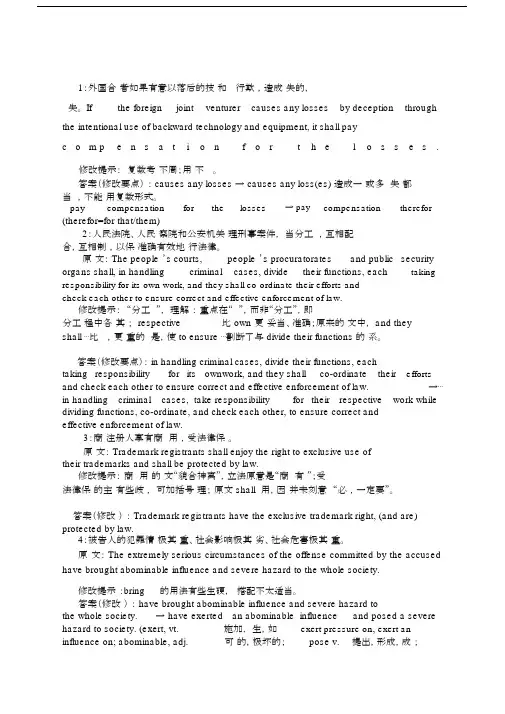
1:外国合者如果有意以落后的技和行欺,造成失的,失。
If the foreign joint venturer causes any losses by deception the intentional use of backward technology and equipment, it shall payc o m p e n s a t i o n f o r t h e l o s s through e s.修改提示:复数考不周;用不。
答案(修改要点): causes any losses → causes any loss(es) 造成一或多失都当,不能用复数形式。
pay compensation for the losses → pay compensation therefor (therefor=for that/them)2:人民法院、人民察院和公安机关理刑事案件,当分工,互相配合,互相制,以保准确有效地行法律。
原文: The people ’s courts, people ’s procuratorates and public security organs shall, in handling criminal cases, divide their functions, each taking responsibility for its own work, and they shall co-ordinate their efforts andcheck each other to ensure correct and effective enforcement of law.修改提示:“分工”,理解:重点在“ ”,而非“分工”,即分工程中各其; respective比own更妥当、准确;原来的文中,and theyshall ⋯比,更重的是,使 to ensure ⋯割断了与 divide their functions 的系。
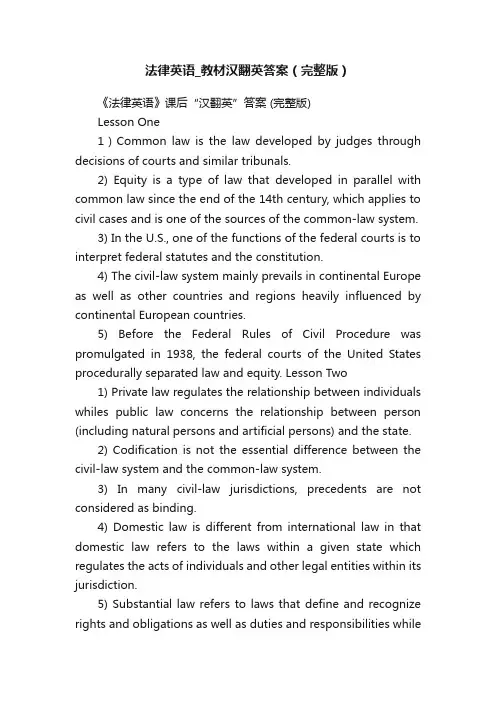
法律英语_教材汉翻英答案(完整版)《法律英语》课后“汉翻英”答案 (完整版)Lesson One1)Common law is the law developed by judges through decisions of courts and similar tribunals.2) Equity is a type of law that developed in parallel with common law since the end of the 14th century, which applies to civil cases and is one of the sources of the common-law system.3) In the U.S., one of the functions of the federal courts is to interpret federal statutes and the constitution.4) The civil-law system mainly prevails in continental Europe as well as other countries and regions heavily influenced by continental European countries.5) Before the Federal Rules of Civil Procedure was promulgated in 1938, the federal courts of the United States procedurally separated law and equity. Lesson Two1) Private law regulates the relationship between individuals whiles public law concerns the relationship between person (including natural persons and artificial persons) and the state.2) Codification is not the essential difference between the civil-law system and the common-law system.3) In many civil-law jurisdictions, precedents are not considered as binding.4) Domestic law is different from international law in that domestic law refers to the laws within a given state which regulates the acts of individuals and other legal entities within its jurisdiction.5) Substantial law refers to laws that define and recognize rights and obligations as well as duties and responsibilities whileprocedural law refers to laws that provides for the mechanism for the realization or performance of rights and duties as well as duties and responsibilities.Lesson Three1) In some countries alcoholic beverages are prohibited from being sold to children.2) Since the 1980s, China has set up and improved the employment service system, which includes employment introduction, employment training, unemployment insurance and employment services.3) Various forms of resistance to desegregation were prevailing in those years.4) It is unjust and unlawful to discriminate against people of other races.5) Just as individuals in a democratic country have equal voting rights regardless of whether they are rich or poor, powerful or weak, all countries in the General Assembly have the same voting rights.Lesson Four1) A crime is an act which may lead to the imposition of punishment.2) Some reports accused BP of criminal negligence in the oil spill in the Gulf of Mexico.3) Modern U.S. criminal law provides that there must be clear definition for all the constituting elements of each and every crime.4) Generally those who provide assistance to people in their criminal act are punishable as accessories or accomplices.5) Failure to act may be punished where the person is undera duty to act. Lesson Five1) Parties to a contract shall fully perform their obligations in accordance with the stipulations of the contract.2) A contract is an agreement between parties which creates, modifies or terminates a civil relationship. A contract established in accordance with law is protected by law.3) A citizen or a legal person shall bear civil liabilities for his failure to fulfill his contractual or other obligations.4) No modification or revocation of a contract may prejudice the parties’claims for damages.5) For a party’s non-performance or his performance unfaithful to the contractual stipulations, the other party to a contract is entitled to demand specific performance or other remedies, and also, compensation for the resulted losses.Lesson Seven1) One who is at fault for infringing upon the civil right or interest of another person shall be subject to the tort liability.2) Where a defective product causes any harm to another person, the manufacturer shall assume the tort liability.3) One who shall assume the tort liability for infringing upon the civil right or interest of another person, whether at fault or not, as provided for by law, shall be subject to the legal provisions in the tort law.4) Where a tort endangers the personal or property safety of another person, the victim of the tort may require the tortfeasor to assume the tort liability such as cessation of infringement, removal of obstruction and elimination ofdanger.5) A network user or network service provider who infringes upon the civil right or interest of another person through network shall assume the tort liability.Lesson Seventeen1) Before the judgment what is to be done is to dispose of the case, while after the judgment is rendered, all that remains to be done is to enforce it.2) If the matter involved in the appeal is of great importance, it ought to be submitted for review.3) There are exemptions from jury service for members of the legal profession, the police force, etc.4) Judges often require that the parties agree upon a schedule of issues so as to accelerate the trial process.5) In the High Court an official shorthand note is, unless the judge otherwise directs, taken of any evidence given orally in Court and of the summing up by the judge. Upon payment of the prescribed fee, a transcript can be made available.Lesson Eighteen1) The arbitration award shall be final and binding on both parties.2) The dispute shall be submitted for arbitration by a mutually nominated arbitrator.3) Where no settlement can be reached, the dispute shall be submitted for arbitration.4) Each party may also directly apply for arbitration to the Personnel Dispute Arbitration Commission.5) Traditionally, our contracts did not contain provisions for arbitration in a third country.。
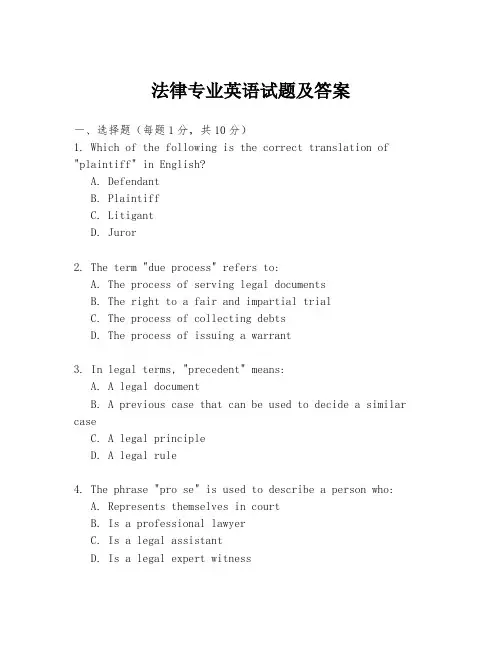
法律专业英语试题及答案一、选择题(每题1分,共10分)1. Which of the following is the correct translation of "plaintiff" in English?A. DefendantB. PlaintiffC. LitigantD. Juror2. The term "due process" refers to:A. The process of serving legal documentsB. The right to a fair and impartial trialC. The process of collecting debtsD. The process of issuing a warrant3. In legal terms, "precedent" means:A. A legal documentB. A previous case that can be used to decide a similar caseC. A legal principleD. A legal rule4. The phrase "pro se" is used to describe a person who:A. Represents themselves in courtB. Is a professional lawyerC. Is a legal assistantD. Is a legal expert witness5. Which of the following is not a type of legal document?A. ContractB. DeedC. WillD. Invoice6. The term "bail" refers to:A. A legal obligationB. A sum of money given to ensure the appearance of a defendant in courtC. A legal feeD. A court order7. "Statute of limitations" is a legal term that means:A. The deadline for filing a lawsuitB. The time limit for a court to make a decisionC. The time limit for a defendant to respond to a lawsuitD. The time limit for a witness to testify8. "Probate" is the legal process of:A. Filing a lawsuitB. Administering an estate after someone's deathC. Issuing a court orderD. Enforcing a contract9. The "Bill of Rights" is a term commonly associated with:A. The first ten amendments to the United States ConstitutionB. A list of legal rights in a contractC. A document outlining the rights of defendantsD. A set of rules for a court proceeding10. "Tort" is a legal term that refers to:A. A criminal actB. A civil wrong that can result in compensationC. A legal documentD. A type of contract二、填空题(每题1分,共10分)1. The legal term for a formal accusation against someone is a(n) _______.2. A(n) _______ is a person who has been granted permission to practice law.3. "Injunction" refers to a court order that requires someone to do, or not do, something.4. The process of a court determining the rights and obligations of parties in a dispute is called _______.5. "Affidavit" is a written statement of facts confirmed by the oath of the party making it, which is used as evidence in court.6. A(n) _______ is a legal document that outlines the terms and conditions of an agreement.7. The term "eminent domain" refers to the power of the government to take private property for public use.8. "Misdemeanor" is a(n) _______ crime, less serious than a felony.9. A(n) _______ is a legal document that proves ownership of property.10. "Litigation" is the process of taking a dispute to court to resolve it through a formal hearing.三、简答题(每题5分,共20分)1. Explain the concept of "double jeopardy" in legal terms.2. What are the main differences between civil law and common law systems?3. Describe the role of a judge in a criminal trial.4. What is the purpose of a "plea bargain" in the legal process?四、论述题(每题15分,共30分)1. Discuss the importance of legal ethics in the practice of law.2. Analyze the impact of globalization on the legal profession.五、翻译题(每题5分,共10分)1. 请将以下句子翻译成英文:“在法律面前,人人平等。
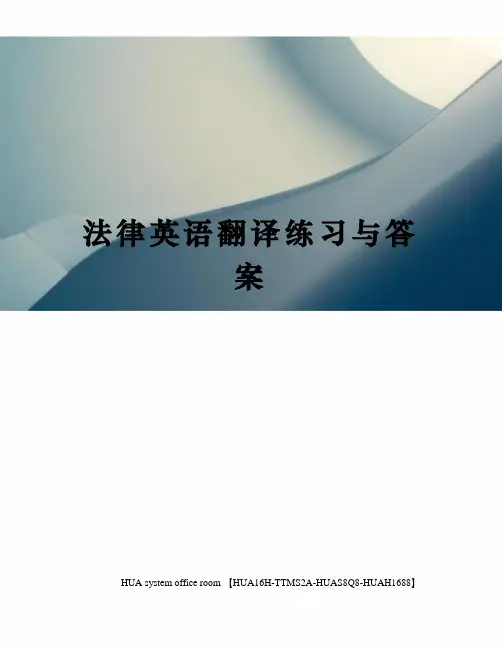
法律英语翻译练习与答案HUA system office room 【HUA16H-TTMS2A-HUAS8Q8-HUAH1688】练习1:外国合营者如果有意以落后的技术和设备进行欺骗,造成损失的,应赔偿损失。
If the foreign joint venturer causes any losses by deception through the intentional use of backward technology and equipment, it shall pay c o m p e n s a t i o n f o r t h e l o s s e s.修改提示:单复数考虑不周;用语不够简洁。
答案(修改要点):causes any losses →causes any loss(es) 造成一项或多项损失时都应当赔偿,不能仅用复数形式。
pay compensation for the losses →pay compensation therefor(therefor=for that/them)练习2:人民法院、人民检察院和公安机关办理刑事案件,应当分工负责,互相配合,互相制约,以保证准确有效地执行法律。
原译文:The people’s courts, people’s procuratorates and public security organs shall, in handling criminal cases, divide their functions, each taking responsibility for its own work, and they shall co-ordinate their efforts and check each other to ensure correct and effective enforcement of law.修改提示:“分工负责”,应理解为:侧重点在“负责”,而非“分工”,即分工过程中各负其责;respective 比own 更为妥当、准确;原来的译文中,and theyshall …比较啰嗦,更严重的问题是,使to ensure …割断了与divide their functions 的联系。
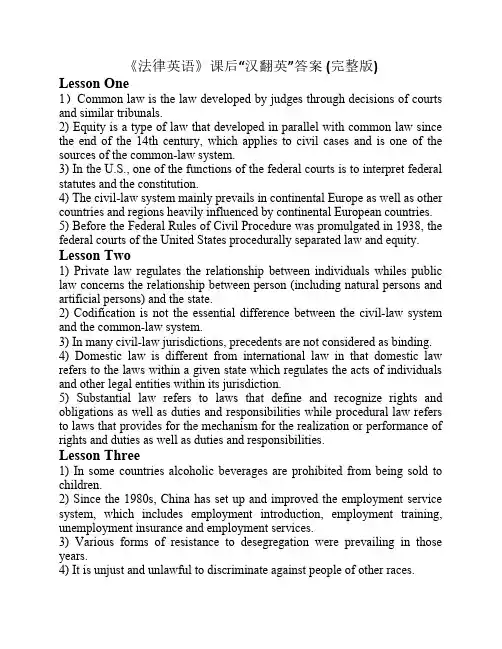
《法律英语》课后“汉翻英”答案 (完整版)Lesson One1)Common law is the law developed by judges through decisions of courts and similar tribunals.2) Equity is a type of law that developed in parallel with common law since the end of the 14th century, which applies to civil cases and is one of the sources of the common-law system.3) In the U.S., one of the functions of the federal courts is to interpret federal statutes and the constitution.4) The civil-law system mainly prevails in continental Europe as well as other countries and regions heavily influenced by continental European countries.5) Before the Federal Rules of Civil Procedure was promulgated in 1938, the federal courts of the United States procedurally separated law and equity. Lesson Two1) Private law regulates the relationship between individuals whiles public law concerns the relationship between person (including natural persons and artificial persons) and the state.2) Codification is not the essential difference between the civil-law system and the common-law system.3) In many civil-law jurisdictions, precedents are not considered as binding.4) Domestic law is different from international law in that domestic law refers to the laws within a given state which regulates the acts of individuals and other legal entities within its jurisdiction.5) Substantial law refers to laws that define and recognize rights and obligations as well as duties and responsibilities while procedural law refers to laws that provides for the mechanism for the realization or performance of rights and duties as well as duties and responsibilities.Lesson Three1) In some countries alcoholic beverages are prohibited from being sold to children.2) Since the 1980s, China has set up and improved the employment service system, which includes employment introduction, employment training, unemployment insurance and employment services.3) Various forms of resistance to desegregation were prevailing in those years.4) It is unjust and unlawful to discriminate against people of other races.5) Just as individuals in a democratic country have equal voting rights regardless of whether they are rich or poor, powerful or weak, all countries in the General Assembly have the same voting rights.Lesson Four1) A crime is an act which may lead to the imposition of punishment.2) Some reports accused BP of criminal negligence in the oil spill in the Gulf of Mexico.3) Modern U.S. criminal law provides that there must be clear definition for all the constituting elements of each and every crime.4) Generally those who provide assistance to people in their criminal act are punishable as accessories or accomplices.5) Failure to act may be punished where the person is under a duty to act. Lesson Five1) Parties to a contract shall fully perform their obligations in accordance with the stipulations of the contract.2) A contract is an agreement between parties which creates, modifies or terminates a civil relationship. A contract established in accordance with law is protected by law.3) A citizen or a legal person shall bear civil liabilities for his failure to fulfill his contractual or other obligations.4) No modification or revocation of a contract may prejudice the parties’claims for damages.5) For a party’s non-performance or his performance unfaithful to the contractual stipulations, the other party to a contract is entitled to demand specific performance or other remedies, and also, compensation for the resulted losses.Lesson Seven1) One who is at fault for infringing upon the civil right or interest of another person shall be subject to the tort liability.2) Where a defective product causes any harm to another person, the manufacturer shall assume the tort liability.3) One who shall assume the tort liability for infringing upon the civil right or interest of another person, whether at fault or not, as provided for by law, shall be subject to the legal provisions in the tort law.4) Where a tort endangers the personal or property safety of another person, the victim of the tort may require the tortfeasor to assume the tort liability such as cessation of infringement, removal of obstruction and elimination ofdanger.5) A network user or network service provider who infringes upon the civil right or interest of another person through network shall assume the tort liability.Lesson Seventeen1) Before the judgment what is to be done is to dispose of the case, while after the judgment is rendered, all that remains to be done is to enforce it.2) If the matter involved in the appeal is of great importance, it ought to be submitted for review.3) There are exemptions from jury service for members of the legal profession, the police force, etc.4) Judges often require that the parties agree upon a schedule of issues so as to accelerate the trial process.5) In the High Court an official shorthand note is, unless the judge otherwise directs, taken of any evidence given orally in Court and of the summing up by the judge. Upon payment of the prescribed fee, a transcript can be made available.Lesson Eighteen1) The arbitration award shall be final and binding on both parties.2) The dispute shall be submitted for arbitration by a mutually nominated arbitrator.3) Where no settlement can be reached, the dispute shall be submitted for arbitration.4) Each party may also directly apply for arbitration to the Personnel Dispute Arbitration Commission.5) Traditionally, our contracts did not contain provisions for arbitration in a third country.。
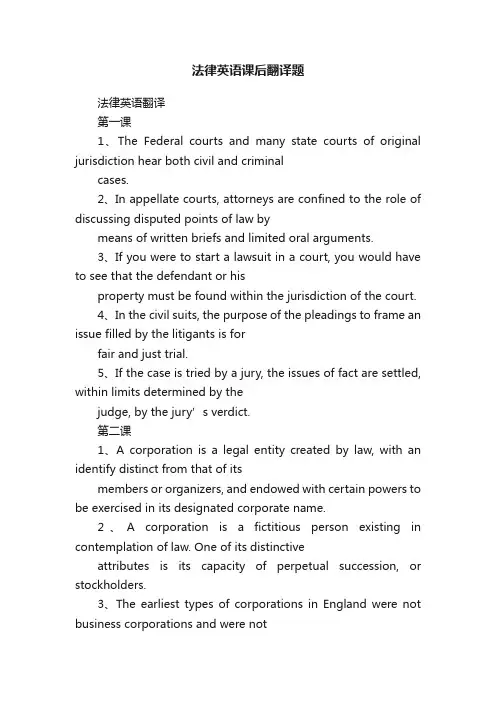
法律英语课后翻译题法律英语翻译第一课1、The Federal courts and many state courts of original jurisdiction hear both civil and criminalcases.2、In appellate courts, attorneys are confined to the role of discussing disputed points of law bymeans of written briefs and limited oral arguments.3、If you were to start a lawsuit in a court, you would have to see that the defendant or hisproperty must be found within the jurisdiction of the court.4、In the civil suits, the purpose of the pleadings to frame an issue filled by the litigants is forfair and just trial.5、If the case is tried by a jury, the issues of fact are settled, within limits determined by thejudge, by the jury’s verdict.第二课1、A corporation is a legal entity created by law, with an identify distinct from that of itsmembers or organizers, and endowed with certain powers to be exercised in its designated corporate name.2、A corporation is a fictitious person existing in contemplation of law. One of its distinctiveattributes is its capacity of perpetual succession, or stockholders.3、The earliest types of corporations in England were not business corporations and were notthe kind of organizations with which we are presently concerned. The earliest chartered English trading or business companies were joint-stock companies, such as the East India Company and the Houdon’s Bay Company.4、Corporations are variously classified according to different bases. Under one basis ofclassification, corporations are either aggregate(the usual form) or sole. They are either public or private. And private corporations are either profit(the ordinary business corporation) or nonprofit(the charitable corporation). In addition to the foregoing classifications, t he term “holding company” is frequently applied to a corporation whose sole or principal business is holding the stock of one or more other corporations.5、By definition, a corporation is an entity distinct from its individual members orstockholders,and is vested in the corporation itself, and not in the stockholders; and neither is ordinarily charged with the debts or obligations of the other.第三课The Nature of Contract of LawA contract, in the simplest definition, is a promise enforceable by law. The promise may be t o do something or to refrain from doing something. The making of a contract requires the mutual assent of two or more persons, one of them ordinarily making an offer and another accepting. If one of the parties fails to keep the promise, the other is entitled to legal recourse. The law of contracts considers such questions as whether a contract exists, what the meaning of it is, whether a contract has been broken, and what compensation is due the injured party.第四课1、Joint venture is two or more investors for the purpose of gaining profit, forming a companywith limited liability, usually in the country of one of the investors in accordance with the laws and regulations of that country.。
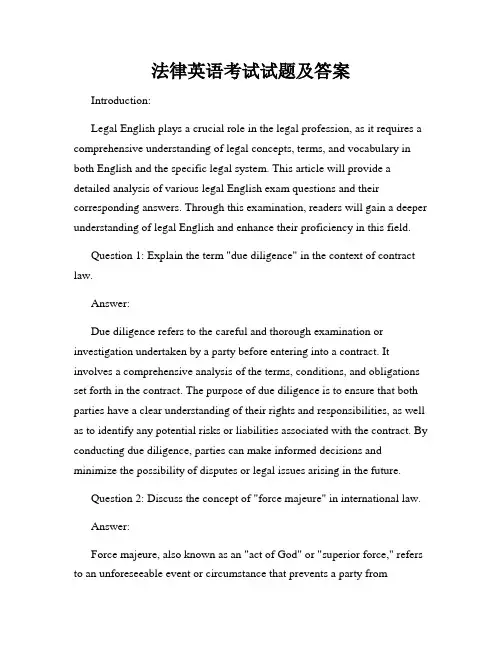
法律英语考试试题及答案Introduction:Legal English plays a crucial role in the legal profession, as it requires a comprehensive understanding of legal concepts, terms, and vocabulary in both English and the specific legal system. This article will provide a detailed analysis of various legal English exam questions and their corresponding answers. Through this examination, readers will gain a deeper understanding of legal English and enhance their proficiency in this field.Question 1: Explain the term "due diligence" in the context of contract law.Answer:Due diligence refers to the careful and thorough examination or investigation undertaken by a party before entering into a contract. It involves a comprehensive analysis of the terms, conditions, and obligations set forth in the contract. The purpose of due diligence is to ensure that both parties have a clear understanding of their rights and responsibilities, as well as to identify any potential risks or liabilities associated with the contract. By conducting due diligence, parties can make informed decisions and minimize the possibility of disputes or legal issues arising in the future.Question 2: Discuss the concept of "force majeure" in international law.Answer:Force majeure, also known as an "act of God" or "superior force," refers to an unforeseeable event or circumstance that prevents a party fromfulfilling its contractual obligations. These events are typically beyond the control of the party involved and cannot be reasonably anticipated or avoided. Examples of force majeure events may include natural disasters, wars, riots, or government actions. In international law, force majeure clauses are commonly included in contracts to protect parties from the consequences of unforeseen events. These clauses typically provide relief or exemption from contractual obligations in the event that a force majeure event occurs, allowing the affected party to suspend or terminate their obligations under the contract.Question 3: Define the term "judicial precedent" in common law systems.Answer:Judicial precedent, also known as stare decisis, is a fundamental principle in common law systems. It refers to the legal doctrine in which the decisions made by higher courts become binding on lower courts within the same jurisdiction. Under this principle, lower courts must follow the legal reasoning and interpretations of the higher courts in previous cases that are similar in nature. Judicial precedent ensures consistency, predictability, and stability in the legal system, as it allows for the uniform application of the law and the development of legal principles over time. However, it is important to note that judicial precedent can be overruled or distinguished when there are significant differences in factual circumstances or legal principles involved.Question 4: Explain the concept of "vicarious liability" in tort law.Answer:Vicarious liability is a legal principle that holds one party responsible for the actions or omissions of another party, even if they themselves did not commit any wrongdoing. This concept often arises in employer-employee relationships, where employers can be held liable for the actions of their employees performed within the scope of their employment. Vicarious liability is based on the idea that employers have a duty of care to ensure that their employees act responsibly and do not cause harm to others. By imposing vicarious liability, the law aims to provide a remedy for victims and encourage employers to exercise proper control and supervision over their employees.Conclusion:Understanding legal English is crucial for professionals in the legal field, as it enables effective communication and interpretation of legal concepts and principles. This article has provided an insightful analysis of various legal English exam questions, encompassing contract law, international law, common law systems, and tort law. By gaining a comprehensive understanding of these topics, aspiring legal professionals can enhance their knowledge and proficiency in legal English, thus paving the way for successful careers in the legal industry.。
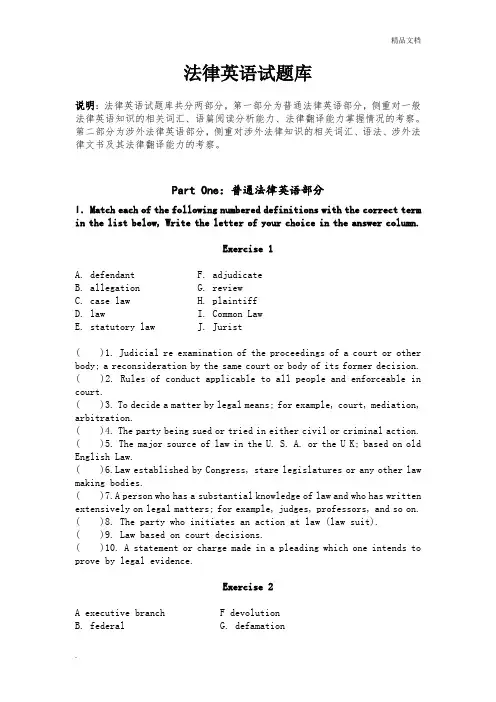
法律英语试题库说明:法律英语试题库共分两部分,第一部分为普通法律英语部分,侧重对一般法律英语知识的相关词汇、语篇阅读分析能力、法律翻译能力掌握情况的考察。
第二部分为涉外法律英语部分,侧重对涉外法律知识的相关词汇、语法、涉外法律文书及其法律翻译能力的考察。
Part One:普通法律英语部分I.Match each of the following numbered definitions with the correct term in the list below, Write the letter of your choice in the answer column.Exercise 1A. defendant F. adjudicateB. allegation G. reviewC. case law H. plaintiffD. law I. Common LawE. statutory law J. Jurist( )1. Judicial re examination of the proceedings of a court or other body; a reconsideration by the same court or body of its former decision. ( )2. Rules of conduct applicable to all people and enforceable in court.( )3. To decide a matter by legal means; for example, court, mediation, arbitration.( )4. The party being sued or tried in either civil or criminal action. ( )5. The major source of law in the U. S. A. or the U K; based on old English Law.( )w established by Congress, stare legislatures or any other law making bodies.( )7.A person who has a substantial knowledge of law and who has written extensively on legal matters; for example, judges, professors, and so on. ( )8. The party who initiates an action at law (law suit).( )9. Law based on court decisions.( )10. A statement or charge made in a pleading which one intends to prove by legal evidence.Exercise 2A executive branch F devolutionB. federal G. defamationC. legislation H. legislative branchD. confederation I. allegationE. judicial branch J. constitution( )11. Laws or written rules which are passed by Parliament and implemented by the courts.( )12. The government department that is responsible for determining the constitutionality of legislative and executive actions, and adjudicating rights and duties of others involved in disputes. It interprets and applies the Law.( )13.A written document defining fundamental legal principle for governance of the people. It may include grants of power and limitations of power.( )14.Passing of power to govern or to make decisions from a central authority to a local authority.( )15.The government department that is responsible for carrying laws into effect.( )16.Group of independent states or organizations working together for common aims.( )17.The government department that is responsible for enacting statutory laws.( )18.Refers to the U. S government and its activities. The United States is a federation of 50 sovereign states.( )19.In pleading, an assertion of fact; the statement of the issue which the contributing party is prepared to prove.( )20.False statement, either oral or written, which tends to injure the reputation of the victim. It may be civil as well as criminal.Exercise 3A.separate property F. adulteryB.bigamy G. beneficiaryC.custody H. separationD.heir I. necessariesE.nonsupport J. guardian( )21. A situation in which parties are not living together but otherwise have legal duties of husband and wife.( )22. The care and possession of minor children of a marriage during a divorce proceeding and after divorce is final.( )23. Property owned By either spouse before marriage or acquired during marriage by gift or inheritance.( )24. A person appointed by the court to supervise and take care of another.( )25. Failure to contribute money, in accordance with one's ability, to the maintenance of a parent as required by law.( )26. Goods and services ordinarily required by and appropriate to an incompetent person's station in life, yet not available or provided by parent or guardian.( )27. The crime of being married to two or more persons at the same time.( )28. Sexual intercourse by a married person with someone other than the offender's spouse.( )29. Anyone who has a legal right to inherit the property of another. ( )30. Anyone who benefits under the terms of a will.Exercise 4A. proprietor F. dividendsB. limited partner G. general partnerC. dissolution H. proxyD. quorum I. liquidationE. merger J. subsidiary( )31. A person who conducts the business of a partnership and has unlimited Liability.( )32. A person who is the sole owner of a business.( )33. A company owned (by a majority of shares or interest) and controlled by another company.( )34. A combination of two or more corporations whereby one remains a legal entity and the other is absorbed.( )35. A person who invests capital and shares in the profits of the partnership but whose liability and share of profits are limited by the amount invested.( )36. The sale and/or distribution of the assets of a business to settle its accounts with creditor and/or stockholders.( )37. The termination of the existence of a legal entity, such as a partnership or a corporation.( )38. A portion of corporate profits divided among the share-holders, in cash and/or stock.( )39. The number of members who must be present at a meeting for business to be transacted; a majority.( )40. The authorization for another to act for a shareholder at a meeting; also, the paper granting the authority.。
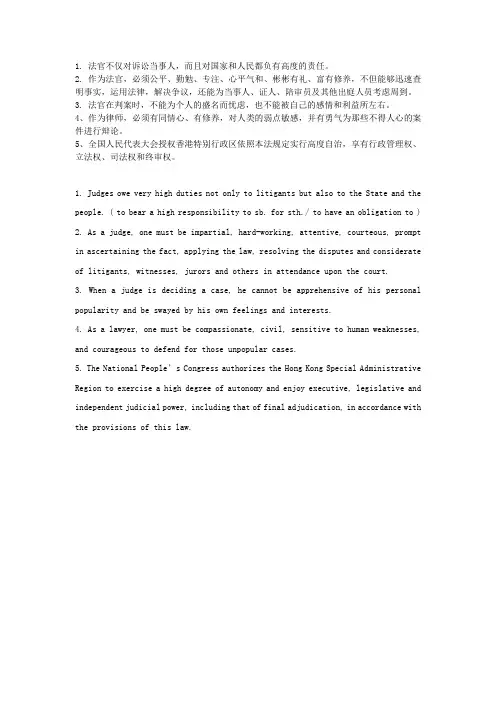
1. 法官不仅对诉讼当事人,而且对国家和人民都负有高度的责任。
2. 作为法官,必须公平、勤勉、专注、心平气和、彬彬有礼、富有修养,不但能够迅速查明事实,运用法律,解决争议,还能为当事人、证人、陪审员及其他出庭人员考虑周到。
3. 法官在判案时,不能为个人的盛名而忧虑,也不能被自己的感情和利益所左右。
4、作为律师,必须有同情心、有修养,对人类的弱点敏感,并有勇气为那些不得人心的案件进行辩论。
5、全国人民代表大会授权香港特别行政区依照本法规定实行高度自治,享有行政管理权、立法权、司法权和终审权。
1. Judges owe very high duties not only to litigants but also to the State and the people. ( to bear a high responsibility to sb. for sth./ to have an obligation to )2. As a judge, one must be impartial, hard-working, attentive, courteous, prompt in ascertaining the fact, applying the law, resolving the disputes and considerate of litigants, witnesses, jurors and others in attendance upon the court.3. When a judge is deciding a case, he cannot be apprehensive of his personal popularity and be swayed by his own feelings and interests.4. As a lawyer, one must be compassionate, civil, sensitive to human weaknesses, and courageous to defend for those unpopular cases.5. The National People’s Congress authorizes the Hong Kong Special Administrative Region to exercise a high degree of autonomy and enjoy executive, legislative and independent judicial power, including that of final adjudication, in accordance with the provisions of this law.。
法律英语试题库及答案一、单选题(每题2分,共20分)1. Which of the following is the correct translation of "plaintiff" in legal English?A. 被告B. 原告C. 证人D. 律师答案:B2. The term "due diligence" in legal context typically refers to:A. 尽职调查B. 尽责调查C. 尽职尽责调查D. 尽职尽责尽责调查答案:A3. In legal English, "contract" is often used to refer to:A. 合同B. 契约C. 协议D. 协议书答案:A4. The phrase "in consideration of" is commonly used in legal documents to mean:A. 鉴于B. 考虑到C. 由于D. 因为答案:B5. Which of the following is not a type of intellectual property?A. 商标B. 专利C. 版权D. 商业秘密答案:D6. The term "tort" in legal English refers to:A. 侵权行为B. 犯罪行为C. 合同违约D. 民事纠纷答案:A7. "Jurisdiction" in legal English means:A. 管辖权B. 审判权C. 执行权D. 立法权答案:A8. The abbreviation "LLC" stands for:A. Limited Liability CompanyB. Limited Legal CompanyC. Legal Liability CompanyD. Legal Limited Company答案:A9. "Probate" in legal English refers to the process of:A. 遗嘱认证B. 遗嘱执行C. 遗嘱公证D. 遗嘱登记答案:A10. "Statute" in legal English is used to denote:A. 法规B. 法律C. 法令D. 条例答案:B二、填空题(每题2分,共20分)1. The legal term for a formal written statement submitted toa court is a(n) _____________.答案:brief2. A(n) _____________ is a legal document that outlines the terms and conditions of a contract.答案:agreement3. The process of challenging the validity of a will is known as _____________.答案:contest4. A(n) _____________ is a legal professional who represents clients in court.答案:attorney5. The term _____________ refers to the legal principle that no one may profit from their own wrongdoing.答案:unclean hands6. A(n) _____________ is a legal document that grants a person the authority to act on behalf of another.答案:power of attorney7. The legal term for a formal written request to a court is a(n) _____________.答案:petition8. A(n) _____________ is a legal document that provides evidence of a debt.答案:promissory note9. The legal term for a formal written order from a court is a(n) _____________.答案:decree10. A(n) _____________ is a legal document that outlines the terms and conditions of a sale of real estate.答案:deed三、判断题(每题2分,共20分)1. The term "lien" in legal English refers to a legal claim on property to secure the payment of a debt. (对/错)答案:对2. "Negligence" in legal English means the failure to exercise reasonable care, resulting in harm to another. (对/错)答案:对3. "Indemnity" in legal English refers to the right to be compensated for a loss or damage suffered. (对/错)答案:对4. A "writ" is a legal document issued by a court that ordersa person to do or refrain from doing a specific act. (对/错) 答案:对5. "Affidavit" in legal English is a written statement of facts voluntarily made by a person under oath. (对/错)答案:对6. "Misdemeanor" in legal English refers to a less serious crime than a felony. (对/错)答案:对7. "Arbitration" is a form of alternative dispute resolution where a neutral third party makes a binding decision. (对/错) 答案:对8. "Eminent domain" refers to the power of the government to take private property for public use without compensation. (对/错)答案:错9. "Venue" in legal English refers to the geographical location where a legal action is brought. (对/错)答案:对10. "Custody" in。
《法律英语》考试时间不变,向老师申请要了两道大题,范围如下:1、段落英译汉(20分):内容涉及刑事程序法,简单涉及美国宪法第五修正案和米兰达警告等。
2、作文题(20分):评述一下审前取证制度;评述抗辩制。
1、段落英译汉:刑事程序法大家看一下教材第一单元第8课(中文即可),是关于刑事程序的内容。
此题应该是老师自己编的英文材料。
美国第五宪法:No person shall be held to answer for a capital, or otherwise infamous crime, unless on a presentment or indictment of a grand jury, except in cases arising in the land or naval forces, or in the militia, when in actual service in time of war or public danger; nor shall any person be subject for the same offense to be twice put in jeopardy of life or limb; nor shall be compelled in any criminal case to be a witness against himself, nor be deprived of life, liberty, or property, without due process of law; nor shall private property be taken for public use, without just compensation.无论何人,除非根据大陪审团的报告或起诉,不得受判处死罪或其他不名誉罪行之审判,唯发生在陆、海军中或发生在战时或出现公共危险时服现役的民兵中的案件,不在此限。
第二届“华政杯”全国法律英语翻译大赛初赛试题试题一:(合同法与侵权法)Contracts also generate general duties of care in dealing with the rights, objects of legal protection and legally protected interests of the contractual partners. Such “collateral” obligations do not normally have any relation to the content of the respective “primary” performance obligation and can therefore in principle become significant in every type of contract. The more ambitious a legal system is in the development of such contractual collateral obligations for the protection of interests already existing independent from the direct performance expectations formed by the contract, the more practical weight is given to the respective concurrence of actions rules, which give details of the relationship of contractual liability with parallel tortuous liability. 合同在规定缔约伙伴的权利、法律保护的客体及受法律保护的利益时,也产生一般的注意义务。
法律英语试题及答案一、单项选择题(每题2分,共10题,满分20分)1. Which of the following is not a legal term?A. PlaintiffB. DefendantC. LitigationD. Negotiation答案:D2. In legal English, "due process" refers to:A. A fair and just legal procedureB. A quick legal procedureC. A legal procedure without any delayD. A legal procedure with minimal paperwork答案:A3. The term "precedent" in law means:A. A previous case that sets a legal principleB. A document that records a legal decisionC. A legal principle that is not bindingD. A case that is not relevant to current legal issues 答案:A4. Which of the following is not a type of contract?A. Sales contractB. Employment contractC. Marriage contractD. Insurance contract答案:C5. "Tort" in legal English refers to:A. A civil wrongB. A criminal actC. A legal documentD. A legal remedy答案:A6. "Probate" is the legal process of:A. Dividing an estate after deathB. Filing a lawsuitC. Registering a trademarkD. Drafting a will答案:A7. "Jurisdiction" in law refers to:A. The authority to make legal decisionsB. The location of a courtC. The type of law being appliedD. The legal profession答案:A8. "Affidavit" is a legal document that:A. Is signed by a judgeB. Is a sworn statement of factsC. Is a request for a court orderD. Is a legal opinion答案:B9. "Statute" is a type of law that is:A. Created by judgesB. Passed by a legislative bodyC. Based on common lawD. Enforced by the executive branch答案:B10. "Moot" in legal context means:A. Unimportant or irrelevantB. A legal argumentC. A type of lawsuitD. A legal document答案:A二、填空题(每题2分,共5题,满分10分)1. A legal dispute that is not resolved by negotiation or mediation may proceed to ________.答案:litigation2. The ________ of a contract is the formal agreement between parties.答案:execution3. A ________ is a person who has been granted the authorityto act on behalf of another.答案:agent4. The ________ is the highest court in many legal systems.答案:supreme court5. A ________ is a legal document that outlines the terms ofa contract.答案:deed三、阅读理解题(每题3分,共3题,满分9分)阅读以下段落,并回答问题。
法律翻译期末试题及答案本文提供了一份法律翻译的期末试题及答案,供学习和参考之用。
试题分为听力理解、阅读理解和翻译三个部分,每个部分均提供了相应的答案。
以下是试题内容:听力理解第一节请听下面的对话,根据对话内容选择正确答案。
1. What is the man's occupation?A. Lawyer.B. Doctor.C. Teacher.2. What is the woman's opinion about the case?A. She is undecided.B. She thinks it is unfair.C. She supports the defendant.3. What does the man suggest?A. Settling the case out of court.B. Going to trial.C. Dropping the charges.第二节请听下面的对话,根据对话内容选择正确答案。
4. What is the man's purpose for calling?A. To inquire about an ongoing case.B. To schedule a consultation.C. To ask for legal advice.5. What kind of assistance is the man offering?A. Financial support.B. Translation services.C. Expert testimony.6. When will the woman be available for a meeting?A. Wednesday afternoon.B. Thursday morning.C. Friday evening.阅读理解阅读下面的短文,根据短文内容选择正确答案。
法律英语考试试题法律英语考试试题在现代社会中,法律英语已经成为了法律从业者必备的一项技能。
无论是律师、法官还是法务人员,都需要掌握一定的法律英语知识。
为了评估和证明法律从业者的英语水平,法律英语考试应运而生。
本文将探讨一些常见的法律英语考试试题,并分析其背后的法律知识。
第一部分:词汇与短语1. What is the meaning of the term "jurisdiction" in legal context?2. Explain the difference between "plaintiff" and "defendant" in a civil lawsuit.3. Define the term "precedent" and its significance in common law systems.4. What is the legal definition of "negligence" in tort law?5. Provide a brief explanation of the term "due process" in criminal law.这些试题旨在考察考生对法律英语词汇和短语的理解。
对于法律从业者来说,准确理解和运用这些术语至关重要。
词汇和短语的准确使用能够帮助从业者与客户、同事和法庭进行有效的沟通。
第二部分:案例分析阅读以下案例并回答问题:Case: John v. ABC CorporationFacts: John purchased a product from ABC Corporation. The product was defective and caused injury to John. John filed a lawsuit against ABC Corporation, claiming compensation for his injuries.Questions:1. What type of legal claim is John making against ABC Corporation?2. What is the burden of proof for John in this case?3. What are the possible defenses that ABC Corporation can raise?4. What remedies can John seek if he wins the case?案例分析是法律英语考试中常见的题型。
p221
1.共有就是由两个或更多的人平等享有的财产权益,该共有权可以是由单独一份遗嘱或转让产生,并且在该遗嘱或转让契约中明确表明该财产为共有;或由独一所有人转让给他自己与他人共有;或是普通共有人或共同占有人转让给自己或其中一部分共有人共有,或全体共有人或其中任何共有人与其他人共有;或由夫妻作为共同财产或其他形式财产所有权人将财产转让给她们自己共有或他们自己与他人共有,或者其中一人与给他人共有,并且在转让契约中明确表明是共有,或让与或遗赠给遗嘱执行人或信托人共有。
2.任何制作、印刷或出版,或致使制造、印刷或出版任何有关出售、出租住房的通知、声明或广告的行为,且该通知、声明或广告含有对种族、肤色、宗教、性别、生理缺陷、婚姻状况、民族等的偏好、限制或歧视,或有该偏好、限制或歧视的意图,均为非法。
3.共同占有财产与普通共有财产的分割。
有管辖权的法院(适格法院)在利害关系人提出衡平法上的救济请求时,可以命令共同财产所有人对共同占有的地产进行分割,并可为此目的指定一个委员会,还可以同样方式分割限嗣继承地产保有人占有的地产,分割地产的法令对所有当事人以及作为继承人而随后主张权力的所有共有人都具有约束力。
4.要求获得地产所有权或占有权的诉讼得在诉因产生之日起21年内提起,但是如果有权提起该诉讼的当事人在诉因产生时未成年、有智障或被监禁,则该当事人可在诉因产生21年期满后,在该种无能力解除后10年内提起该诉。
p228
1、A citizen’s personal property shall include his lawfully earned income,housing,saving,articles for daily use ,cultural relics ,book,reference materials,trees,livestock ,as well as means of production the law permits a citizen to possess and other lawful property .A citizen’s lawful property shall be protected by law ,and no organization or individual may appropriate ,encroach upon ,destroy or illegally seal up ,distain ,freeze or confiscate it.
2、Property may be owned jointly by two or more citizens or legal persons. There shall be two kinds of joint ownership ,namely co-ownership by shares and common ownership .Each of the co-owners by shares shall enjoy the right and assume the obligations respecting the joint property in proportion to his share .Each of the common owners shall enjoy the rights and assume the obligation respecting the
joint property . Each co-owners by shares shall have the right to withdraw his own share of the joint property or transfer its ownership .However,when he offers to sell his share ,the other co-owners shall have a right of pre-emption if all other conditions are equal.
3、If the owner of a buried or concealed object is unknown ,the object shall belong to the state .The unit that receives the object shall commend or give a material reward to the unit or individual that turns in the object.Lost-and -found objects ,flotsam and stray animals shall be returned to their rightful owners ,and any costs thus incurred shall be reimbursed by the owners.
4、Neighboring users of real estate shall , motivated for the desire to help production make things convenient for people’s lives, enhance unity and mutual assistance ,and be fair and reasonable ,maintain proper neighborly relations over such matters as water supply ,drainage , passageway ,ventilation and lighting .Anyone who causes obstruction or damage to his neighbor , shall stop the infringement, eliminate the obstruction and compensate for the damage.。